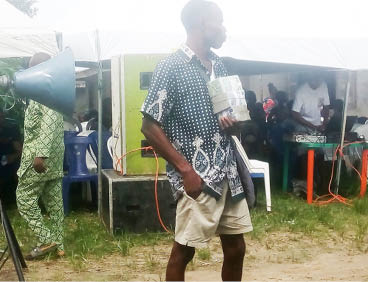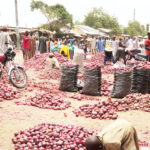Amidst the biting economy and hardship in Nigeria, traders have taken to hawking of the Naira—Nigeria’s legal tender, at public functions, events and other places for survival.
Though the practice is predominant across Delta State, in South South Nigeria, but the ‘lucrative business’ according to the operators is fast spreading to other states in the region.
The Central Bank of Nigeria (CBN)’s policy of limiting the volume of cash in the hands of individual is aiding the business of hawking naira, a situation, according to economists, that may increase the rate of inflation in the country.
It was gathered that since some commercial banks now limit the amount of money paid over the counter to customers due to CBN’s policy, people now patronise those hawking the naira, as well as Point of Sale (POS) operators.
Daily Trust Saturday observed that the naira hawkers make brisk business during social functions such as burial, marriage, birthday and chieftaincy title or award ceremonies, where people who want to either spray or donate money will patronize them.
The Central Bank of Nigeria (CBN) act 2007 prohibits naira hawking and other forms of naira abuse, and stipulates that sale by vendors or hawking of naira note is an offence under Section 21(4) of the CBN Act 2007.
The act states that; “For the avoidance of doubt, hawking or selling of Naira, spraying of, dancing or matching on the Naira or any note issued by the Central Bank of Nigeria during social occasions or otherwise howsoever shall constitute an abuse and defacing of the Naira or such note and shall be punishable under Sub-section (1) of this section.
This Sub-section of the Act prescribes “imprisonment for a term not less than six months or to a fine not less than N50,000 or to both such fine and imprisonment for anyone guilty of “spraying of, dancing or matching on the Naira or any note issued by the Bank during social occasions.”
One of the naira hawkers in Uwheru Town in Ughelli North LGA of Delta, simply known as Oghene, told Daily Trust Saturday that with the hardship in the country, he had to think of how to make additional income apart from his main business.
Oghene, who said he hawks items such as handkerchief, biscuits, sweet and other such things around ceremony venues and other public places, said he channels the money from his sales to hawking to make more gains.
According to him, “If you want to collect N20,000, you will transfer N26,000 to my account or you pay through POS. If you need N50,000, you will pay N65,000 and if it is N100,000, you will pay N130,000, so the charges depend on the amount one needs. Sometimes we negotiate.
“If I don’t do this hawking business, I will not be able to take care of my family’s needs. Things are very difficult in this country, there is no help from anywhere, and this business is better than stealing or committing crime to make ends meet.
“I started trading on the naira in 2023 during the naira scarcity period. Then, I used to hawk my provisions around motor parks in Ughelli, and I discovered that most people who wanted to travel got stranded because they did not have physical cash to pay their fare, so I conceived the idea of giving them money from my sales with little interests. I was doing it until the business become popular and other people also engaged in it.”
Another hawker, Ejiro, told Daily Trust Saturday that since she finished secondary school, there has been no money to further her education, so she started hawking provision and then used the money from provision sales to exchange for interest in other to save for her education.
She admitted that she knows that hawking money is against the law of the land, but says the policies of the present government in Nigeria has made life very difficult for Nigerians to survive in their land.
“Since Tinubu came in as the president, things have been very difficult, if one doesn’t devise means like this, you cannot survive in today’s Nigeria. What is the cost of garri in the market? If I don’t do this business, should I go and steal?
Hawking, selling of Naira unlawful – NOA
The National Orientation Agency (NOA) describes the hawking and selling of naira by vendors for profit making as an unlawful act prohibited by the government laws.
The Coordinator of NOA in Delta State, Mrs Tracy Ikolomi, told Daily Trust Saturday that the practice is against the Clean Note Policy of the Naira, and must be discouraged at all cost.
She said: “Naira hawking is the unlawful selling of naira by vendors to members of the public for profit motive. In our society today, the sale or hawking of naira by vendors in parties, occasions or functions for the purpose of spraying has become fashionable and prevalent.
“The Central Bank of Nigeria Act 2007 prohibits naira hawking and other forms of naira abuse. Sale by vendors or hawking of naira note is an offence under Section 21(4) of the CBN Act 2007.
“This is also against the Clean Note Policy of the Naira. When naira is sold and sprayed during occasions, it is mal-handled and defaced, which reduces the quality of Naira notes in circulation and makes the Naira be in bad condition to allow for processing and free acceptability by the general public.
“It also depletes the longevity of the Naira note and places a huge financial burden on the government for Naira reprint.
“National Orientation Agency (NOA) has the mandate to advocate and sensitize the people on sundry issues of national importance such as respect for national symbols amongst which is the Nigerian currency (Naira note). NOA has various means of engaging the people for behavioural change/adjustment which includes but not limited to advocacy to and town hall meetings with critical stakeholders on the subject matter like the CBN, the law enforcement agencies, civil society, traditional rulers, youth bodies, associations and unions as well as religious leaders.
“The Agency also carries out public enlightenment through door-to-door campaign, motorized campaign using PAS, Theatre for Development (the use of drama on the subject matter), printing and distribution of IEC materials, social media handles, focus and target groups, especially during occasions, parties and functions where the offence is committed,” she said.
The Economic and Financial Crimes Commission (EFCC) has said that spraying or hawking of naira is a crime, stating that when caught, the perpetrator will face the full weights of the law.
The Acting Zonal Director in charge of Delta, Edo, and Ondo states, Effa Okim, who stated this when the Nigeria Union of Journalists (NUJ), Warri Correspondents’ Chapel visited him, said the society must stand up to discourage the abuse of naira instead of clapping for those that spray money at the public functions.

 Join Daily Trust WhatsApp Community For Quick Access To News and Happenings Around You.
Join Daily Trust WhatsApp Community For Quick Access To News and Happenings Around You.

